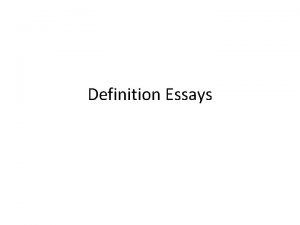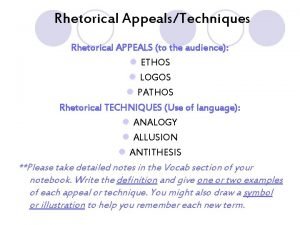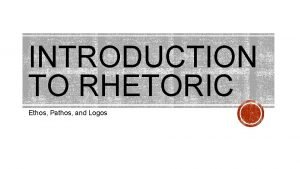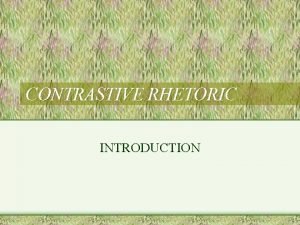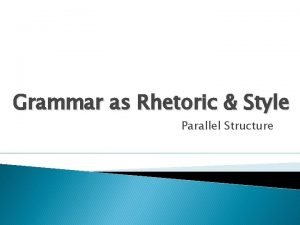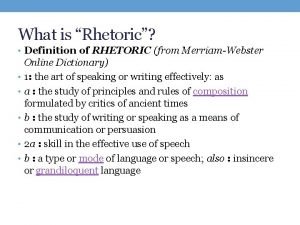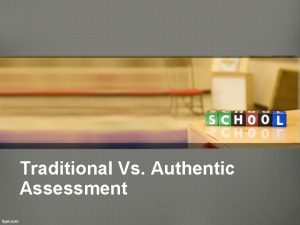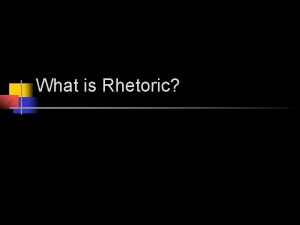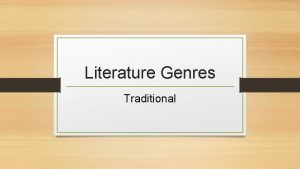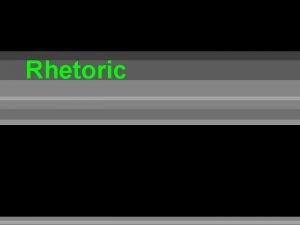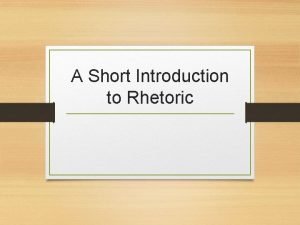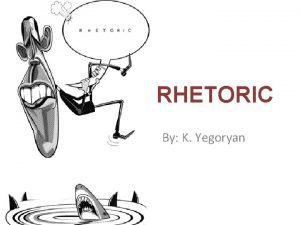Rhetoric Rhetoric The traditional definition of rhetoric first














- Slides: 14

Rhetoric • Rhetoric: • The traditional definition of rhetoric, first proposed by Aristotle, and embellished over the centuries by scholars and teachers, is that rhetoric is the art of observing in any given case the “available means of persuasion. ” • Close Reading: • Reading to “develop an understanding of a text that is based first on the words themselves and then on the larger ideas those words suggest. ” • Rhetorical Analysis: • Defining an author’s purpose, then identifying and analyzing the techniques and strategies employed to achieve that purpose.

Why Goals and Objectives? • Course Goal—broad, long-term • To understand the elements of argument and other genres or writing, and apply them in both writing, and analysis. • Daily Objective—accomplishing “pieces” of the “goal, ” one step at a time • To understand evaluate the finer elements argument


Whose idea was it? • Socrates: 469 -399 B. C. E. • Father of Western philosophy and Mentor to Plato. Epistemology and logic. • Plato: 424 -348 B. C. E. • Student of Socrates and founder of “The Academy” Philosophy, logic, ethics, rhetoric and mathematics. • Aristotle: 384 -322 B. C. E. • Student of Plato, and teacher to Alexander the Great.

Eco Fact of the Week

Recognition and Congratulations! • Happy Birthday!

AP Language and Composition Wednesday, 23 November 2016 • Time will pass; will you? 19 school days remain in the fall semester. • Today’s Objectives: • To review requirements for upcoming satire presentations • To read and evaluate an ad satirizing consumerism. • To conduct a close reading, and formulate higher-level questions.

51 of the most beautiful sentences in literature @buzzfeed. com 19. “America, I’ve given you all and now I’m nothing. ” --Allen Ginsburg, “America”

Housekeeping • Have you registered for your AP exams? • Remaining assessments total 500 points: • Huck Finn: 3 assignments (250 points, two written, one oral); 1 test (100 points) • Satire Project (100 points) • 1 set vocab sentences (50 points) • The Daily Course Calendar was last updated Nov. 15. • Writing Contests are now posted on the class website —you can earn optional credit for these. • Bringing your book to class—it’s on the assignment calendar, and you are responsible for bringing it!

Coming Due—do not squander time— that’s the stuff life’s made of! • Monday, 11/28: • Satire Projects (period 3 only)—periods 0 and 1 begin on Tuesday. • Thursday, 12/1: • Chapters 1 -18, The Adventures of Huckleberry Finn— tii upload required • Monday, 12/5 • Vocab log #6 (I have suspended the sentence writing)

The Satire Project • How to give an effective presentation • Preparedness—being ready to roll—beware technology • Practice—handling nerves • Analysis: • The target of your criticism • The medium and strategies you chose, and why? • Can I just read my analysis?

Today’s Class— please have your vocabulary logs on your desks • Analyzing a satire • The Onion’s “Magna Soles”—continued camera reads? • We have one more workshop this fall (introductions/positions), and at least ten coming in the spring semester • Close Reading—ancillary reading for Huckleberry Finn • Vocab logs out! • Constructing higher-level questions for a Socratic Discussion—you will be called on, randomly. • Hearing is not listening • Talking is not speaking

Evaluation • The 9 -point rubric • 9 -point descriptors • The Anchor Papers—these are “samples”— responses vary • Camera Shots (these are worth 50 points) • Scoring…

AP one-word scoring descriptors for timed writing essays: Effective and Adequate Essays Ineffective Essays • A 9 is “unique” • A 4 is “inadequate” • An 8 is “sophisticated” • A 3 is “unsuccessful” • A 7 is “effective” • A 2 is “confusing” • A 6 is “adequate” • A 1 is “ugh? ” • A 5 is “uneven”
 Put first things first definition
Put first things first definition Rhetorical advertisement
Rhetorical advertisement Define rhetorical triangle
Define rhetorical triangle Pathos definition rhetoric
Pathos definition rhetoric Contrastive rhetoric definition
Contrastive rhetoric definition Parallel words in a sentence
Parallel words in a sentence Merriam webster rhetorical devices
Merriam webster rhetorical devices Hình ảnh bộ gõ cơ thể búng tay
Hình ảnh bộ gõ cơ thể búng tay Bổ thể
Bổ thể Tỉ lệ cơ thể trẻ em
Tỉ lệ cơ thể trẻ em Gấu đi như thế nào
Gấu đi như thế nào Thang điểm glasgow
Thang điểm glasgow Chúa yêu trần thế
Chúa yêu trần thế Các môn thể thao bắt đầu bằng tiếng chạy
Các môn thể thao bắt đầu bằng tiếng chạy
